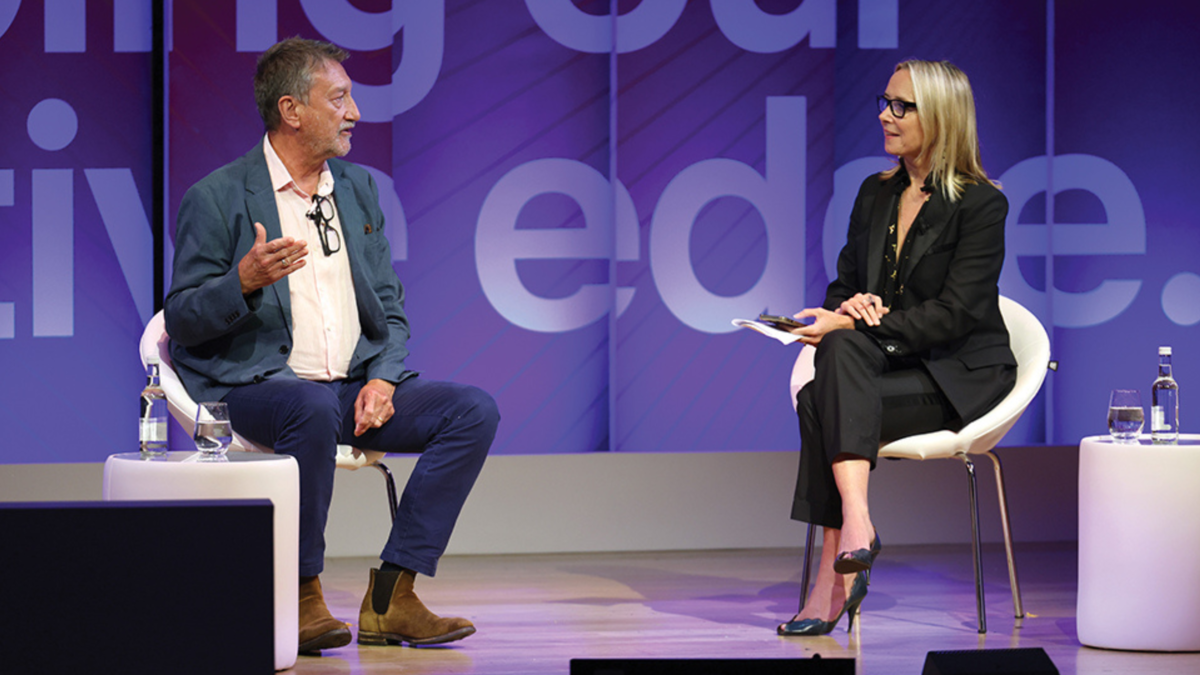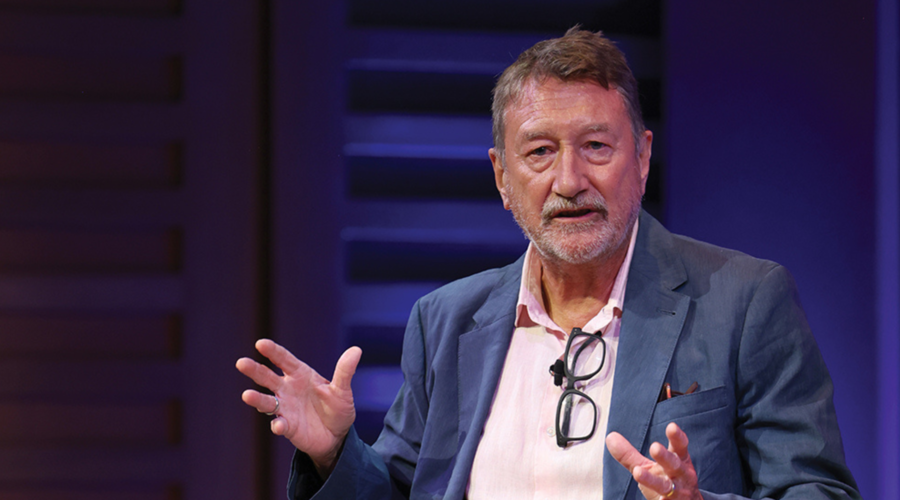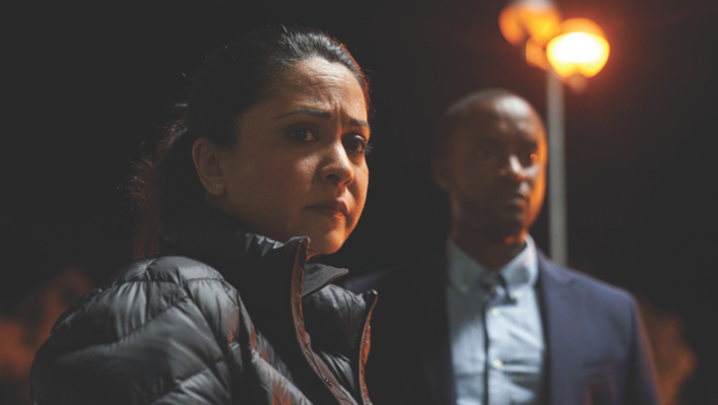All you need to be a writer, according to Leonard Cohen, is “arrogance and inexperience”. Quoting this from the RTS Convention stage, Steven Knight, added: “It’s so true. Arrogance, you need. Inexperience? You don’t know what you shouldn’t be doing, and it’s good to not find out.”
BBC News’s Katie Razzall asked him: “You must have learned things along the way?”
“I try not to,” he replied.
This seems unlikely, given that Knight has risen to become one of the UK’s premier creative talents: a director, creator and producer of TV and film, co-devising the global hit Who Wants to Be a Millionaire?, penning the Oscar-nominated Dirty Pretty Things and best known for conjuring up the criminal world of Tommy Shelby and co in the cultural phenomenon that is Peaky Blinders.
Knight’s newest venture is Digbeth Loc, a studio hub in Birmingham that is housing the forthcoming Peaky Blinders film. His recent BBC series This Town was the first major drama to shoot there earlier this year. The hub is expected to create more than 700 jobs and add £30m to the local economy.
Given the fragile state of the screen industry, Knight accepts that it is a precarious time to launch a new studio. “Yes, there’s overcapacity of studios at the moment. But you don’t then knock them all down. Because, when things pick up again, it will be the same as it was before.”
Creating a studio base away from the M25 came with challenges – the project was eight years in the making – but Knight said there’s more than a levelling up appeal to Digbeth Loc. “It’s near to the city centre, right next to HS2. People who work in the industry know it’s long hours and brutal work – we try and put everything on campus to create an environment where they can have physical comfort, so they don’t have to get into a car at two in the morning, go to a little hotel and come back.
“We can be a fitting catalyst for change in challenged areas”
“People can feel they’re in a truly creative environment, with big productions and small productions feeding into each other. We’ve got the National Youth Theatre moving in. We’ve got the Royal Shakespeare Company coming. We want to do theatre, arts – all of that.”
Knight said that disused buildings are of little use to other industries “but they’re gold dust to us”. He cited the Banana Warehouse in Digbeth, “sitting there like an old lady falling apart”, which has been turned into the new MasterChef studio. “We can be a fitting catalyst for change in challenged areas. Not just because it’s a good thing to do, but because what we want is there,” said Knight.
Affordable housing and improving skills in the local workforce is part of the Digbeth Loc plan too. “We’re not landing it like a spaceship and putting barbed wire around it. We’re making it part of the community,” Knight said.
With its significant ripple effect, he called on Lisa Nandy, the new Culture Secretary, to consider a regional variation to filming tax breaks. “So if it’s 20%, you could have 21% in a particular area. People would howl a bit about that and it could be temporary, but it could stimulate the industry in particular regions.” Nandy, speaking later that day at the RTS Convention, lauded Knight for the “huge difference” he had made to Birmingham, so he certainly has her ear.
Knight also called on the Government to invest in the creative industries more broadly, reiterating the phrase “not because it’s a good thing to do”, but, he said, “because it makes a lot of money for the country. This isn’t making washing machines – this is making stuff that goes out into the world and becomes how the world sees us.”
Peaky Blinders is a case in point. The series was picked up by Netflix in 2014, rolling out to the world that Brummie accent and flat-cap style. Snoop Dogg, Brad Pitt and Tom Cruise are now among its fans.
On the topic of how local stories can go global, a constant feature of the day’s sessions, Knight said: “I don’t like that word ‘local’. The upset and passion of someone in Rotherham is the same as the upset and passion of someone anywhere else in the world. If you can depict that honestly, then other people will recognise it, no matter where it’s set.”

Undoubtedly, Peaky Blinders has found its biggest success at home, where it topped BBC iPlayer’s most watched list in 2022 for its sixth and final series. Things could have been very different. Knight revealed that he first pitched the idea to Channel 4 when he started out as a screenwriter in the 1980s. “I’m glad it didn’t happen. Not because it was Channel 4 – I chose it because that was a good place to go – but the technology wasn’t right to depict a period drama like that properly. So then I started making movies and that was great, then television started to emerge again.”
Given the breadth of talent Knight has worked with in his 40-plus years in the business, and with the Huw Edwards scandal hanging over the TV industry, Razzall asked if TV has a culture problem, and if he called out bad behaviour when he saw it.
While pointing out that the word “talent” is problematic because it enables a different category of treatment, he replied: “Bad behaviour, like taking advantage of one’s position and slowing things down in the production, is unforgivable. Bad behaviour in terms of good and bad and morality, it’s not my position to pass comment on that, unless it’s a specific thing in a specific environment.”
Knight is now preparing for the Peaky Blinders movie, with Saltburn star Barry Keoghan and Dune’s Rebecca Ferguson joining lead actor Cillian Murphy in the cast. He is also working on his next project, for Netflix, about the rise of the Guinness dynasty in Dublin and New York in the 19th century. It’s called House of Guinness, but, said Knight: “I’m calling it The Crown with beer!”
Session Four: ‘In conversation With Steven Knight’. The writer, executive producer and director was in conversation with Katie Razzall, Culture and Media Editor, BBC News. The producer was Diana Muir. Report by Shilpa Ganatra.




